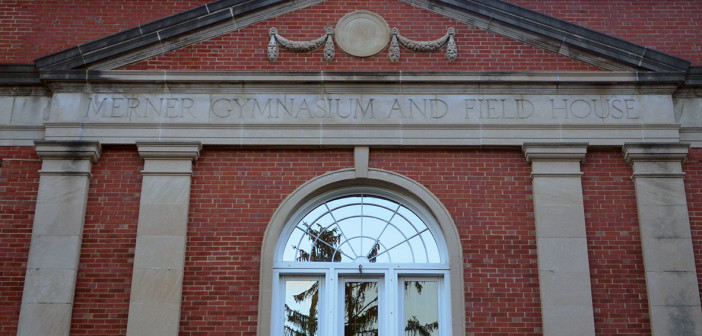On the south end of North Central College’s campus, located between the Residence/Recreation Hall and Benedetti-Wehrli Stadium is the long-standing Merner Field House.
The Nichols Hall fire in 1929 led to the construction of Merner Field House in 1930 with donations from the Pfeiffer family and efforts of Edward Rall, North Central’s president at the time.
Now, Nichols Gym serves as the wrestling room in the field house.
Merner adopted the term “field house” right away. “It was called a field house because the floor inside was dirt,” said athletic director James Miller.
Other than being the first major sports complex at campus, Merner was a huge project. “Merner was the second largest indoor facility in the Chicagoland area, next to the stadium where the Bulls and Blackhawks played,” said Miller.
North Central College cannot do any huge construction to Merner for a couple reasons, one of them being cost.
“The main reason would be because of the American with Disabilities Act (ADA),” said Miller. “If there were any major changes, we would have to put in sprinkler heads and a second floor elevator, which is an ADA requirement, and that would cost over a million dollars.”
Merner opened its doors 85 years ago and has received modern upgrades since then. “We did a major renovation here in 1987 with new (athletic) offices,” said Miller. “Also, the inside of the building was painted in the early 1980s.
“President Hammond approved the bleachers that we got in the gym in 2013. They made a world of difference as far as the experience goes for the student-athletes and fans,” said Miller.
This past year, the football team raised over $100,000 that went towards new equipment in the weight room on the second floor.
Aside from the building’s historical context and new additions, the field house holds special memories for many North Central alumni.
“Everyone who graduated from 1930 on did everything in Merner: intramurals, recreation, athletics, and social events. They even had concerts and dances here,” said Miller. “We used to do everything in Merner because there was no other building.”
Miller is among those who have an emotional connection to Merner. “I’ve spent my whole adult life in Merner Field House. I played football and wrestled here as an undergraduate student, and now I’m in the middle of my 29th year working here.
“I’m very committed to making sure we do not neglect Merner, and how important it is to maintain a building of this nature,” said Miller. “I also know what it means to so many people; it captures that 18- to 22-year-old time period of their lives.”

